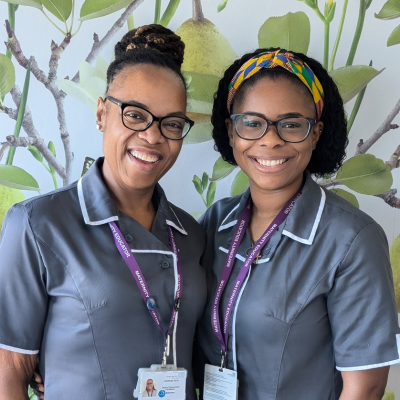
 May 2023
May 2023
What do you do?
In a nutshell, we’re here to support midwifery students, help them navigate their placements in our services during their training and help them with any problems they face. That means supporting around 120 student midwives and maternity support workers who may be in training at any one time.
We work closely with our university partners, King’s College London, London South Bank University and the University of Greenwich and often support communication between the universities, the midwives and the students to help ensure things go smoothly.
We are responsible for running inductions for all new students and returning students. During the course of their training we deliver workshops and study days at the universities and in the hospital. This includes clinical skills sessions delivered alongside university clinical teachers, workshops for third year student midwives to help them to start applying for jobs and transition days to help them successfully transition from being a student midwife to working as a newly qualified midwife.
We often act as “mums to the student midwives” too. We are there to help them deal with any personal issues and to signpost them to other support services that they may need. You bring your whole self to training and work, so we want to make sure we help them reduce other stresses in their lives that may be impacting on their training, so they get the best training experience they can during their placements with us.
What practical experience do student midwives get on your units?
Student midwives spend blocks of time doing very hands on placements in our units during their training and we oversee these. They are supported during their time on the units by practice supervisors and practice assessors.
Our student midwives get rich, wide-ranging hands-on experience across our antenatal, labour and birth and post-natal settings in the hospital and community. They also gain very valuable experience in their out of midwifery placements, where they get to spend time in other areas such as in our main theatres, gynaecology and neonatal settings.
What can student midwives expect from their training at Guys’ and St Thomas’?
Absolutely everything!
They get knowledge and experience of working in a diverse team offering all aspects of maternity care. They support pregnant women and birthing people from a wide range of backgrounds, with a wide range of underlying medical conditions. They gain significant exposure to supporting people with medically complex pregnancies as well as those who choose to birth their baby in their own home with midwives caring for them.
Guy’s and St Thomas’ serves a very diverse local population and we receive referrals from London, the south east of England and even nationally. We are co-located with Evelina London Children’s Hospital which has a fantastic level three neonatal intensive care unit and a paediatric intensive care unit. So, our midwives support pregnant women and birthing people requiring extra care for babies in the womb where it’s been identified during pregnancy that the baby may be born with a complex condition and need immediate care after birth.
We provide some of the most complex care that any midwife will ever see in their career as well as midwifery-led care. So, we believe if you train with us, you can go and be a midwife absolutely anywhere. But we obviously hope you would want to stay and develop your career with us after qualifying as a midwife too.
Students midwives in our hospital get to work with a fantastic team of talented midwives, obstetricians, and other colleagues from a diverse range of backgrounds.
A large amount of research takes place in our hospitals, so the students get to an insight into the way we build research into our maternity services too.
What are the core skills of a midwife?
It’s so important that midwives are committed to providing excellent care to all. Patience, kindness, compassion, empathy, the ability to really listen and not dismiss someone’s concerns or questions, and practical skills are all vital.
Why does Guy’s and St Thomas’ mean so much to you Cherese?
This place is firmly rooted in my family’s history. My grandmother came to England as part of Windrush and gave birth to all six of her children here. My mum then had me here, and I had my own daughter here. I went on to start my training as a midwife five years after my own daughter was born.
So, Guy’s and St Thomas’ means so much to me from a personal and professional perspective. It’s testament to the team I work with, the people we care for and the way this organisation supports progression that I stayed after my training and am still here.
I know first-hand what it means to someone to be supported by the team, and I now love playing a role in supporting the next generation of midwives.
What do you most enjoy about your role Morenike?
This job is like a mixed box of chocolates. You might suddenly get a surprise chocolate that bursts in your mouth.
I love seeing students grow, seeing them go from first year, to second year to third year and them seeing them fly away with the skills they need to be really successful in their midwifery careers.
And what about you Cherese?
I get a huge sense of achievement from supporting a student who’s not going through a great time, helping them get through it, and them saying thank you! Knowing that I’ve made a difference.
I also love working with all my colleagues. There are colleagues I mentor now who I supported as students and there are people I work with now that mentored me while I was training or in my early days of being a midwife.
What is your most memorable moment Cherese?
Graduating as a midwife, because of my journey to get there. What I went through personally and academically. Realising that anything is possible if you put your mind to it.
And what about you Morenike?
The first time I got asked to coordinate the labour ward in another Trust as quite an inexperienced band 6 midwife. When I was asked to do it, I thought to myself, do they really have that much faith in me to coordinate the ward? I realised that they did! That told me that I was doing well. It really boosted my confidence, as I realised that others around me could see my potential. It made me tell myself I needed to reach for the stars and I could get there.
Cherese, what would you both say to someone considering becoming a midwife?
Midwifery is a career you can start at any time. I was 28 years old with a five year old in tow when I started my training, while Morenike was 18. There were people from very different backgrounds, with very different life and work experience, and of very different ages on my course. But we all shared a common goal of advocating for the people we support through pregnancy, labour and afterwards and providing them with the best care.
Delivering babies is about 5% of a midwife’s job. After people have given birth, I remind them that they did all the work. We’re just here to help them deliver their baby safely.
Search our existing midwifery vacancies.
Find out more about our maternity services.

Thank you to the children and young people who have so brilliantly illustrated our blog pages.